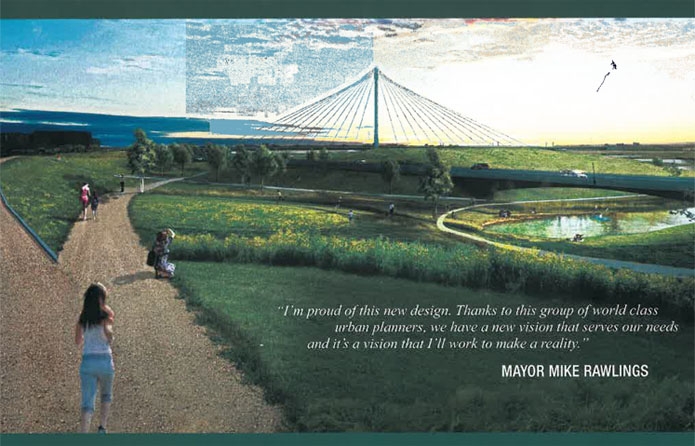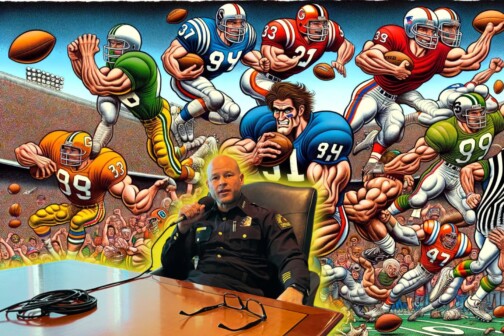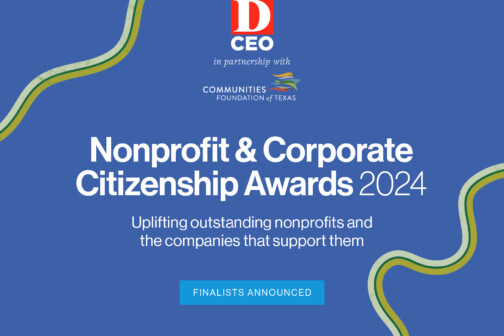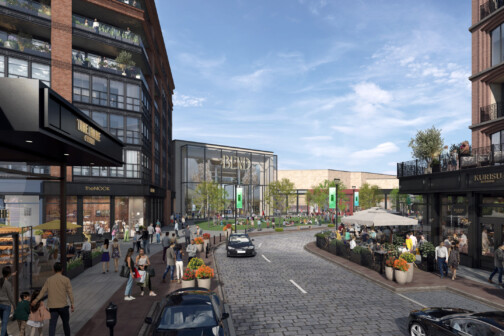I received a mailer this week from the Trinity River Commons Foundation. It’s a four-panel fold-out brochure that is, for all intents and purposes, the real purpose and product of this entire Trinity River Parkway Dream Team design charrette garbage that we have been wading through for the past six months.
On the cover, there’s the now-familiar image of the revised “vision” for the Trinity River Project – the one with the parkway running through elevated berms as the sun sets against digital people who mill about under the shade of trees that the U.S. Army Corps of Engineers has already said cannot and will not be planted in the levee. Overlaid on the image in white italic font is a quote from Mayor Mike Rawlings in which he once again squawks the words “World Class” like some trained parrot sitting on Trinity Commons Foundation Executive Director Craig Holcombs’ shoulder.
We all knew this was coming, the Dream Team’s rendering disseminated to thousands of unsuspecting Dallas citizens, who, in the 9 seconds the image sits in their hands on the way from the mailbox to the recycle bin, will wonder at the glorious dreams the future holds for this city.
Curiously, although it arrived just days before the all-important May election, there is no mention of an election, no photo of Mike Rawlings, and no indication as to why this four-panel fold out brochure is being sent to Dallas residents at this particular moment. It resonates, instead, like a thoughtful gesture. “We thought you might want to know what awesome things we have in store,” it says. Or perhaps more accurately: “Relax, we got this.”
Inside, some bullet points lay out the usual mix of truth, half-truth, and flat out lies that surround all of the pro-toll road propaganda. It says the Trinity Parkway will provide traffic relief for I-35 and Southern Dallas, which it won’t. It of course makes no mention that many of the aspects of the Dream Team’s plan are incompatible with the engineering plans that have already been approved by federal authorities, or that Larry Beasley, the lead author of the Dream Team vision, told the city council when he presented the plan that it should only be adopted only after being submitted to a process of public debate and review.
In the “next steps” section there is no mention of a public review or conversation. Instead, we have “we’ve got this” assurances from three headshots, all of whom should send up red flags. There’s Ron Kirk, who has continued to tell people the road will help relieve congestion when federal studies have shown that it will actually increase congestion on many of the roads serving southern Dallas. There’s Former Mayor Tom Leppert, the salesman of the last disinformation campaign against Angela Hunt and the toll road referendum in 2007 that Jim Schutze recounts today over on Unfair Park. And there’s Former U.S. Senator Kay Baily Hutchinson, who helped pass legislation that removed the Trinity River Floodway from federal environmental oversight, paving the way for the environmental catastrophe that the toll road – so-called the Alternative 3C design – would be.
They all say they love this new plan, a new plan whose very authors admitted they drew up without paying very close attention to the details – from engineering specifics to financial realities – that would impact whether or not it is at all possible to implement the new plan.
Finally, the back flap contains the richest little bit of political SOMA – an excerpt from a Dallas Morning News editorial that appeared just after the Dream Team released their draft vision: “City staff now has its marching orders.”
From a position of cold objectivity, the mailer is a rather remarkable piece of political showmanship, even managing to puppet the DMN’s editorial board into backing their propaganda campaign. But I can’t admire it from a detached position of bemused objectivity because, well, I live in this city and I care about this city, and the mailer represents so much of what is sour about how Dallas operates.
Here I could go off on the flurry of recent controversies that have capped-off a particular tense election season. There are those emails, which have revealed that non-profits have funneled money to the city in exchange for a commitment that specific contractors obtain Trinity-related work. There are the trumped up felony charges against Scott Griggs, accusations which no one has yet sworn to under oath, and which have all the appearance of an attempt to misdirect, intimidate, and seek political retribution. Or maybe it’s a good time to bring up what Rawlings said when the Dream Team’s vision was first presented, that “We have just met this beautiful lady, and I’m not going to get married today.” With that in mind, the mailer sure looks like a sham wedding.
But I want to focus instead on the underlying implication of the mailer, the fact that it is a political mailer sent days before an election whose essential message is “What election? Relax, we’ve got this.”
It is hardly a message that needs to be reinforced. After all, as it stands, no one votes in city elections. Voter turnout for the election this Saturday is expected to be a dismal 6 or 7 percent. The last two mayoral elections saw about 13 percent vote. That’s pathetic.
I can understand why people don’t vote. Most people aren’t interested in the politics of city hall. Partisan politics don’t drive people to the polls for city elections, and in order to have an informed opinion, you have to work hard to familiarize yourself with the issues, which can be complicated, arcane, or dull – or, as is the mostly the case, all of the above.
But when people don’t vote, they remove themselves from the public process. And the fewer the number of people who are involved in the public process, the easier it is for people who are deeply connected to or invested in that process to have disproportionate influence. That’s why the Trinity Commons Foundation doesn’t want you to think about the election. Just sit back and reassure yourself that you don’t have to pay attention to city politics because Kirk, Hutchison, and Leppert are on it — they’ve got this.
The problem, however, is that when only 6 or 7 percent of the people who live in this city participate in deciding who should represent their interests at city hall, we end up with a system of government that functions less like a democracy, and more like something along the lines of a tyranny of supposed experts.
Some of the emails that have come out of the trove obtained by Griggs and Kingston paint a picture of how this kind of governmental system functions. When there is a lack – or even outright distrust – of public oversight, private entities, sometimes believing they are acting altruistically, fill-up or infiltrate positions of influence. This city’s active and powerful philanthropy sector can grow into a parallel decision-making body, using private donations to fund individual visions and then grafting them onto the public process. In ways, the Trinity River Project appears to have been operating like a privatized branch of city government, with funding and policy input coming from The Trinity Trust, the Trinity Commons Foundations, the CityDesign Studio, and elsewhere.
One of the results of this kind of situation is a fostering of a sense of ownership of the public sphere on the part of private individuals. The experts – including entities like the NCTCOG, who operate and advocate their position according to the dogmatic logic of cold engineering, or The Trinity Trust, whose desire to realize an idealistic vision of a grand public park inadvertently bullies public input and feedback out of the design and oversight process – take on a proprietorial relationship with the workings of city government by virtue of their investment of time, commitment, and financial means. Public oversight is seen as suspect or meddlesome. Great design can’t be done by committee; grand visions are realized by keeping the public out of the way.
This is why The Trinity Commons Foundation is sending you mailers that are essentially telling you to relax, the experts have everything under control. The experts are the people whose lives are bound-up in this city in a way yours isn’t. You have your job, your families, your hobbies, the things you look forward to, read about, think about, watch. They have the city. It’s their legacy. They’re doing it for you. So don’t screw with it.
The thing is, as archaic and byzantine as city issues and policies can be, it isn’t terribly difficult to see through the duplicities and manipulations at play in the whole controversy surrounding the Trinity River Project. It is as simple as looking at the watercolors that are being sold to voters and realizing that they don’t correspond with the facts and history at play. It doesn’t take much digging into the contradictions and elusive logic employed by the supporters of the status quo. And if someone is sending you a political mailer that is essentially telling you not to vote, then you probably can figure out that that’s the person you don’t want to be listening to – or at least the person you want to start listening to more carefully and closely.
And yet, that’s how it works in Dallas because we don’t vote. We don’t vote, even though the people who hold office in the city of Dallas, whose job it is to keep an eye on the workings of the city’s bureaucracy, on the tangle of experts and influences who are entrenched in the way the bureaucracy operates, will affect your life – will literally shape the physical space that affects the way you live your day-to-day – more profoundly than the national or international news kerfuffle of the day.
The only way to fix city hall is to get more people to care and to pay attention – and to get those people to vote. So don’t just vote Saturday, make sure you get five of your friends, colleagues, or associates to know that you voted and why you voted. Get them to start paying attention. Get them to realize they can’t assume that just because whatever business association they’re tangentially involved with backs this or that politician it means that they should too. That just because political mailers show up at their homes with pretty pictures and quotes from the Dallas Morning News it doesn’t mean they are necessarily reflecting reality or the truth. Tell them to vote, because you care about your city and your city needs your participation.







